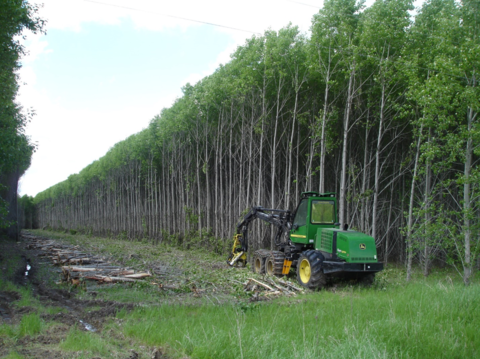What potential uses could you find for a fast-growing tree? Have you ever wanted to quickly produce shade on your property, create a privacy screen, or a windbreak? Our May 7 blog, “Agriculture and forestry can provide mutual benefits,” talked about the benefits that trees can bring to agricultural land. Practices such as windbreaks, riparian buffers, silvopasture, and alley cropping bring many benefits to working lands. These benefits may be realized sooner with a fast-growing hybrid tree.
The Natural Resources Research Institute (NRRI), which is part of the University of Minnesota-Duluth, is leading efforts to develop fast-growing hybrid poplar trees that are disease-resistant and root easily from cuttings. They use standard plant breeding techniques to cross Minnesota cottonwood trees with European black poplar. There is no danger of these trees becoming invasive, as the weak seedlings need to be protected from weeds for several years to survive.
What can a harvested hybrid poplar tree be used for? It’s a versatile tree with many uses. Like aspen or cottonwood, it can be used for firewood, electricity and heat generation, lumber, plywood, and paper production. There are also exciting new developments coming in the bioenergy and bioproducts fields. For example, research at the NRRI has produced ethanol and plastics from hybrid poplar. Imagine a future where fuel for our vehicles and the plastics used to build them come not from fossil fuels, but from renewable trees!
The University of Minnesota’s hybrid poplar trees are not yet publicly available. Plans are to patent them as markets expand in the Midwest, and then they will be available through local growers. Updates on this project can be found at the NRRI's hybrid poplar project page.
University of Minnesota Extension is developing a network of people interested in learning more about growing and using hybrid poplar. We are creating a series of educational webinars and workshops on the latest developments in hybrid poplar. If you would like to be notified of upcoming events, please email Jeff Jackson at jeffj@umn.edu.


